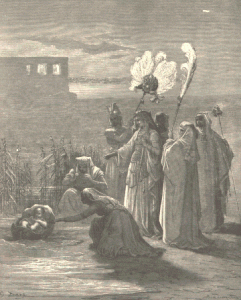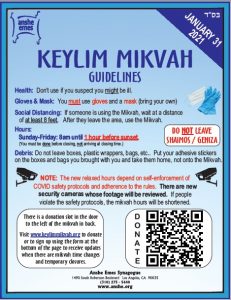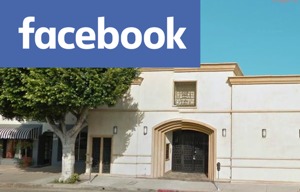A. Summary
1. A New Pharaoh Oppresses The Israelites.
Yaakov’s descendants were now all in Egypt, where they flourished in numbers. A new Pharaoh, fearful that the Israelites would join his enemies in overthrowing him, instituted a policy of oppression to reduce the Israelites to slaves. Supervised by cruel taskmasters, the Israelites were forced to build the fortresses and storage cities of Pithom and Rameses. Despite Pharaoh’s efforts to reduce the Jewish birth rate, it steadily increased, leading Pharaoh to order the Hebrew midwives to kill male infants at birth. However, fearing Hashem, the midwifes disobeyed Pharaoh, leading him to decree that every newborn Jewish male be drowned in the Nile.
2. Moshe is born; Moshe is adopted By Pharaoh’s Daughter. Amram and Yocheved, members of the tribe of Levi, gave birth to Moshe soon after Pharaoh’s death edict. (They had two prior children, Miriam and Aharon.) After Yocheved could no longer keep Moshe’s birth a secret, she placed him into an ark in the Nile (under Miriam’s supervision). Pharaoh’s daughter came to bath in the Nile, saw the ark and sent one of her maidens to fetch it. She realized that it was a Hebrew child and, moved by pity, decided to adopt him. Miriam came forward and was allowed to find him a nurse, whereupon she returned with Yocheved, who would raise Moshe and teach him the traditions of his ancestors. Moshe was taken to the palace, at which time he was named “Moshe” (“drawn out of the water”).
3. Moshe Kills An Egyptian Overseer. After he had matured, Moshe went to be among his fellow Israelites and observed their suffering. One day, he noticed an Egyptian overseer savagely beating an Israelite and, seeing no one else around, killed and buried the overseer. The next day, Moshe intervened in a quarrel between two Israelites, during which one of them asked him who he was to judge them and whether he intended to kill them as he had killed the overseer. It now being clear that his act was known and he was in grave danger, Moshe fled to Midian (in the Sinai’s southeastern region). He came to a well where he protected the seven daughters of Yisro (Midian’s spiritual leader) from unfriendly shepherds, following which he was welcomed by Yisro and tended his sheep. Moshe soon married one of the daughters, Zipporah, and they had two sons, Gershom and Eliezer.
4. Moshe Sees The Burning Bush. While Moshe was in Midian, Pharaoh died. Pharaoh’s successor intensified the Israelites’ oppression and the Israelites cried out to Hashem for help. While tending Yisro’s sheep, Moshe saw an amazing sight — a thornbush which burned but wasn’t consumed. As he gazed in wonder, Hashem spoke to him for the first time, commanded him to remove his shoes (since it was holy ground) and informed him that he was to be Hashem’s messenger to take the Israelites from Egypt into Israel.
5. Hashem Assures Moshe That He Is Worthy To Lead The Israelites. Moshe told Hashem that he was unworthy of this awesome task, but Hashem assured him that He would assist him. Moshe asked what reply he should give when the Israelites would ask for G-d’s name. Hashem replied that He could be revealed by the declaration, “Eyeh Asher Eyeh” (“I will be what I will be”). Moshe was then told to tell the Elders of Israel of Hashem’s appearance and that they were to demand that Pharaoh allow the Israelites to offer sacrifices to Hashem in the wilderness. Pharaoh would refuse, but Pharaoh would thereafter be smitten by Hashem’s plagues and forced to relent, and the Israelites would leave Egypt laden with riches. Moshe protested that the Israelites would not believe him, whereupon he was given the power to perform three miracles to convince them (i.e., his rod would turn into a snake and vice versa; his hand would contract leprosy and then be cured; and he would turn water from the Nile into blood). Moshe, still hesitant, protested that he did not have the requisite speaking ability, but was assured that his brother Aharon would be his spokesman.
6. Moshe Meets With The Israelites. Moshe met Aharon at Mt. Chorev and told him what had happened. Upon reaching Egypt, they assembled the Elders of Israel and told them Hashem’s words. After Moshe performed the miracles, the Israelites affirmed their belief that Hashem was answering their cries for help and bowed down to worship Hashem.
7. Moshe and Aharon Meet With Pharaoh. Moshe and Aharon appeared before Pharaoh and asked him to let the Israelites go and deliver offerings to Hashem in the wilderness. Not only did Pharaoh reject their request, but he imposed even harsher decrees against the Israelites — they now had to deliver the same amount of bricks, but would not be given straw to help them build the bricks. The overseers flogged the Hebrew foremen because they were unable to perform this impossible task. The Israelites’ appeal to Pharaoh for mercy was rejected and they blamed Moshe and Aharon for worsening their situation. In response to Moshe’s expressions of frustration, Hashem assured him that Pharaoh would eventually be compelled by Him to let the Israelites go.
B. Divrei Torah
1. Lilmode U’lilamed (Rabbi Mordechai Katz)
a. The Israelites’ Suffering In Egypt. Among the explanations for the Jews’ suffering in Egypt are the following: (a) the Jews’ travails were a means of refining and purifying the new Jewish nation. (Sefer Yalkut Meam Loez.) In this view, Egypt was the “iron furnace” which helped mold the Jews into a holy and cohesive people. Their impurities were removed and the experience gave them the common bond making them ready for “Matan Torah” (receiving the Torah). In this way, they were like iron, which must go through fire before it loses its dross and becomes hardened; and (b) the oppression in Egypt helped the Jews better appreciate Hashem’s bountiful gifts. The harder it is to attain something, the more welcome it is when attained. After suffering in Egypt, the Jews were in a position to fully value their freedom as a nation under Hashem’s guidance and eagerly accept the spiritual nourishment of the Torah.
b. Moshe as Leader. Why was Moshe chosen to lead to Jews? Among other reasons, Moshe directed his heart and mind the share the experiences of his fellow Jews. Although he enjoyed the privileges of a palace upbringing, he empathized with the plight of those Jews who were enslaved. This quality of concern for others helped make Moshe an outstanding leader.
c. The Burning Bush. In Shemos Rabah, Chazal offer several explanations for why Hashem appeared to Moshe in a burning thornbush: (a) the thornbush is a seemingly insignificant creation, small and apt to cause pain with its prickles; Hashem wanted to point out that even the “lowest” of creations can miraculously become inflamed if filled with the Divine spirit (a lesson that even the humblest person can make history if filled with Hashem’s holy spirit), and to show His empathy for the “lowly”; (b) one only encounters pain taking one’s hands out, not putting them into, a thornbush; similarly, the Israelites were first welcomed in Egypt, but were later prevented from leaving; and (c) just as the bush was not consumed, the Jews of Egypt (and in subsequent generations) would not be destroyed.
2. Growth Through Torah (Rabbi Zelig Pliskin)
a. Try to help others even if think you won’t succeed; frequently, you’ll accomplish more than you imagined. The Torah says that Pharaoh’s daughter “stretched out her arm” and took the ark containing Moshe. Rashi explains that she stretched out very far and was able to miraculously save Moshe. The Kotzer Rebbe said that this teaches us that we must do everything in our power to save someone, even if we think we can’t succeed. We can, with Hashem’s help, often accomplish much more than we imagined.
b. Learn to see others’ suffering. In discussing the statement that “Moshe saw their [his fellow Israelites’] suffering”, Rashi notes that he made a special effort that his eyes should see, and his heart should feel, their suffering. Rabbi Aryeh Levin stared at each of his students as they entered the school so that he could assess and address their individual aspirations/needs — e.g., who was anxious to learn, who was preoccupied; who was hungry, who lacked adequate clothing.
c. You ultimately help yourself when you help others. Moshe saved Zipporah at the well; she later saved his life. The Chofetz Chaim teaches that, while it shouldn’t be our motivation for doing kindness, all acts of kindness we do for others are eventually repaid. One can never know how Hashem will send aid, and therefore, one must always practice good deeds for they may someday prove directly beneficial. Rav Yecheskel Landau once noticed a gentile boy shivering and crying in the winter cold. Rav Landau tried to calm him and asked him what was the matter. The boy replied that he had been sent by his parents to sell some wares, but thugs had stolen all the money he made. He was afraid to face his parents pennyless. Taking pity, Rav Landau gave the boy some of his own money which the boy accepted most gratefully. Many years later, on Erev Pesach, Rav Landau was preparing the Seder when he heard a knock at the door. He opened the door to find a tall gentile youth. The youth said, “Don’t you remember me, Rabbi? I am the boy you once comforted by giving me money in the street. And now I have come to return the favor which I have never forgotten. I overheard the non-Jewish bakers talking about how Jews always buy bread from them right after Pesach when they have none of their own. I heard the baker say that this year they are planning to poison the bread and in this way kill all the Jews and I thought you should know this.” Rav Landau thanked the youth and told his fellow Jews that because of a mistake in the calendar they should refrain from eating bread an additional day. When the bakers complained to the king that the Jews were not buying bread from them as they always did, Rav Landau said that he would buy bread, provided the bakers took a bite from it first. When they refused to do so, their evil plot was revealed and the Jews of the town were saved, thanks to Hashem’s help and Rav Landau’s kindness to the boy!
d. Serve Hashem by acting in an elevated manner in difficult situations. Hashem told Moshe “the place upon which you are standing is sacred land”. The Chofetz Chaim teaches that this means that the exact situation in which you find yourself is sacred; if your life situation is difficult, it is exactly in that situation that Hashem wants you to serve Him. (As Chazal teach “according to the difficulty is the reward”; the Chofetz Chaim said “a fool makes mud out of gold, but a wise person makes gold out of mud”.)
3. The Chassidic Dimension (the Lubavitcher Rebbe, Rabbi Menachem M. Schneerson, z’tl) (the Lubavitcher Rebbe, Rabbi Menachem M. Schneerson, z’tl)
a. Counting By Names. The Parsha begins “And these are the names of the children of Israel who came to Egypt . . . “. Rashi notes that “Although He counted them by name while they were alive, He counted them again after their passing in order to make known (and demonstrate) His love for them; for they are likened to the stars, which He takes out and brings in by their numbers and names”. Why by both numbers and names? Counting emphasizes commonalities; names emphasizes individuality. Each Jew is counted among (and part of) the Jewish community and Hashem, but has his/her own name and unique qualities. Hashem’s love recognizes this duality of each Jew.
b. Defying Pharaoh. When Moshe and Aharon relayed Hashem’s message to pharaoh, he responded: “why are you distracting the people from their work? Get back to “your own business”. Chazal teach that Moshe, Aharon and the Levites weren’t subject to slave labor. As Rambam explains, Pharaoh permitted the Jews, as was customary in every nation, to have their wise persons and teachers and this was the Levite’s task. However, the idea that they should disregard their brethren’s plight and “mind their own business” was Pharaoh’s, not a Jewish, attitude. We must improve our own physical and spiritual lot, but must also look out the physical and spiritual betterment of others.
4. Majesty Of Man (Rabbi A. Henach Leibowitz)
Trust Through Torah. Moshe’s hesitancy to assume leadership wasn’t based upon his concerns about taking the Israelites out of Egypt (after all, what enslaved people would refuse his offer to lead them out of slavery?); rather, the Ramban explains that he feared that they wouldn’t follow him into Israel where they would be confronted in battle by seven powerful nations since he was not sure how he could assure them that he could guide them safely to inherit the promised land? Hashem responded that, after receiving the Torah at Mt. Sinai, the Jewish people would have absolute trust in Moshe. It was the Torah — not the ten plagues, splitting of the Red Sea, giving of manna, etc. — that would lead to their complete and everlasting faith in Moshe and Hashem.
5. Love Thy Neighbor (Rabbi Zelig Pliskin)
a. We must feel the suffering of others, even when it means a loss of our own personal pleasure. Moshe went out from the luxury of the royal palace to see his fellow Israelites’ suffering; we, too, must “go out” to see and respond to others’ suffering.
b. We must be happy for others’ good fortune. “And when he [Aharon] sees you, he will be glad in his heart”. The Midrash states that Aharon merited wearing the breastplate (which was worn by the High Priest when he served in the Holy Temple) as a reward for his unreserved happiness upon greeting Moshe (he wasn’t jealous of Moshe’s leadership position).
6. Wellsprings of Torah (Rabbi Alexander Zusia Friedman)
The Attribute of Modesty. And Moshe said to Hashem: “Who am I, that I should go to Pharaoh . . . ” Moshe, as humble as he was, did not consider himself worthy of being the deliverer of the Jewish people. Thereupon, Hashem answered him that his very question was proof of his fitness for the task. Hashem calls only on those who do not think overly highly of themselves. Thus, of all the mountains, Hashem chose lowly Mt. Sinai as the place upon which to give the Torah, for while the higher mountains boasted of their heights, Mt. Sinai remained little in its own eyes. Similarly, since Moshe remained little in his own eyes, he was worth of leading the Jewish people. (Avnei Ezel)
7. Living Each Day (Rabbi Abraham Twerski)
The Meaning of Empathy. Rabbi Yeruchem Levovitz learns out from this Parsha the meaning of true empathy. He draws upon a comment from the Midrash which Rashi quotes in this week’s Parsha: “And it was in those days that Moshe grew up and went out amongst his brethren and saw their travails.” Rashi comments that Moshe put his “eyes and heart into suffering with them.” Moshe did not merely observe their distress; rather, he threw his entire being into understanding the depth of their distress, to know every tiny detail of it. But, it does not stop here. The Midrash goes on to say that Moshe put his shoulder under their load and shared the burden with all his brethren. This was no so much to help them, says Rabbi Levovitz, since Moshe could only provide a limited amount of help to such a multitude. Rather, he shared in their hard labor so that he could truly share in their pain, exhaustion and crushed spirit. Then, and only then, could he be truly empathetic. As Pirke Avos teaches, sharing in another’s burden is an essential for the acquisition of Torah. It is fundamental not only for mitzvos between man and man, but between man and G-d as well. Since true empathy is essential for Torah, one can’t be truly Torah observant if one is derelict in this trait. Ritual piety without sharing in others’ burdens is not Torah observance. The natural feelings people have cause them to isolate themselves from others who are suffering. For example, we do not want our meals disturbed by the thought that there are people who are starving. But, Torah observance is not designed to provide one with maximum comfort; the Torah requires us to investigate the depth of other peoples’ distress and, as Moshe did, feel along with those who suffer. This is true empathy.
8. Ve-She-Non-Tom (Rabbi Elias Schwartz)
“Achdus” (Unity). One of Pharaoh’s harshest decrees was when he said “Do not continue to give them straw with which to make bricks, but let them gather their own straw. Yet, they must produce the same amounts of bricks as previously. Reb David, the Rebbe from Laluv notes that Hebrew words for “do not continue” are spelled without an “aleph”. Yet, in the sentence quoted, it is spelled with an aleph. This changes the meaning of the meaning, for it derived from the root letters meaning “to gather together”. This was also part of Pharaoh’s decree; not only were they not given straw, but they were commanded not to gather together in groups. Pharaoh wanted to destroy the unity of the Jewish people. He knew that as long as the Jewish people were together, they could withstand any harsh decree and would eventually triumph over their troubles.




 Visit the group and request to join.
Visit the group and request to join.
